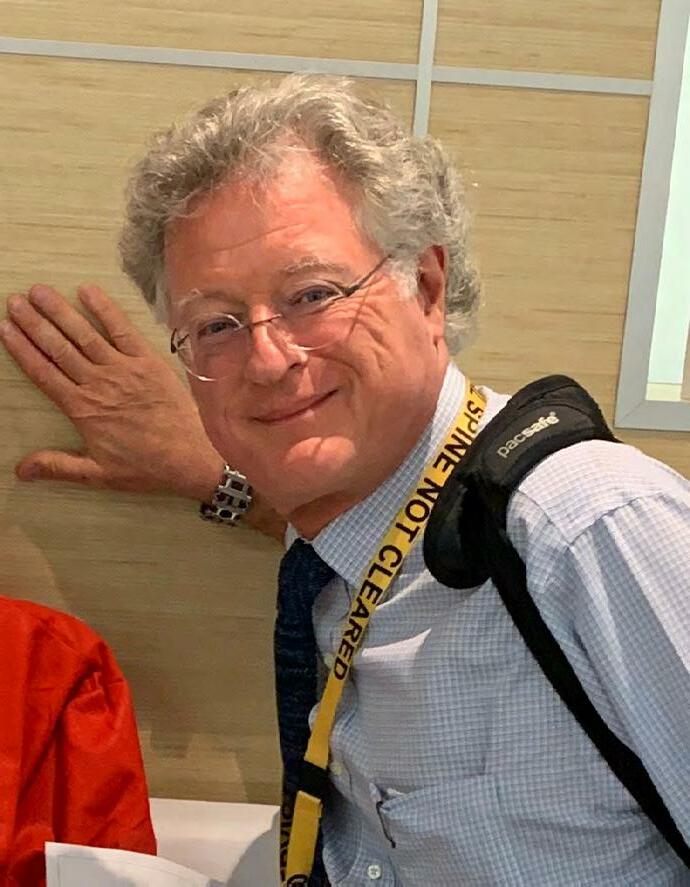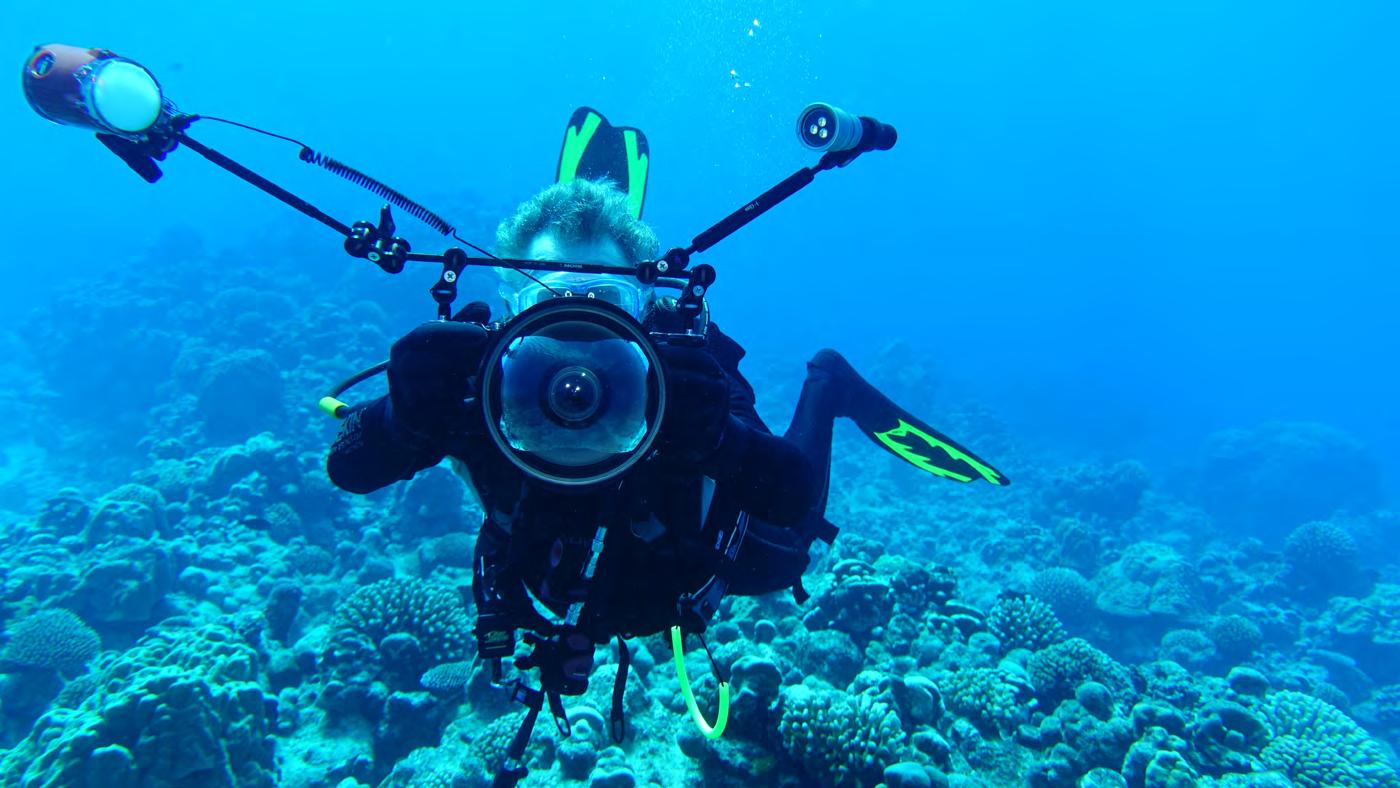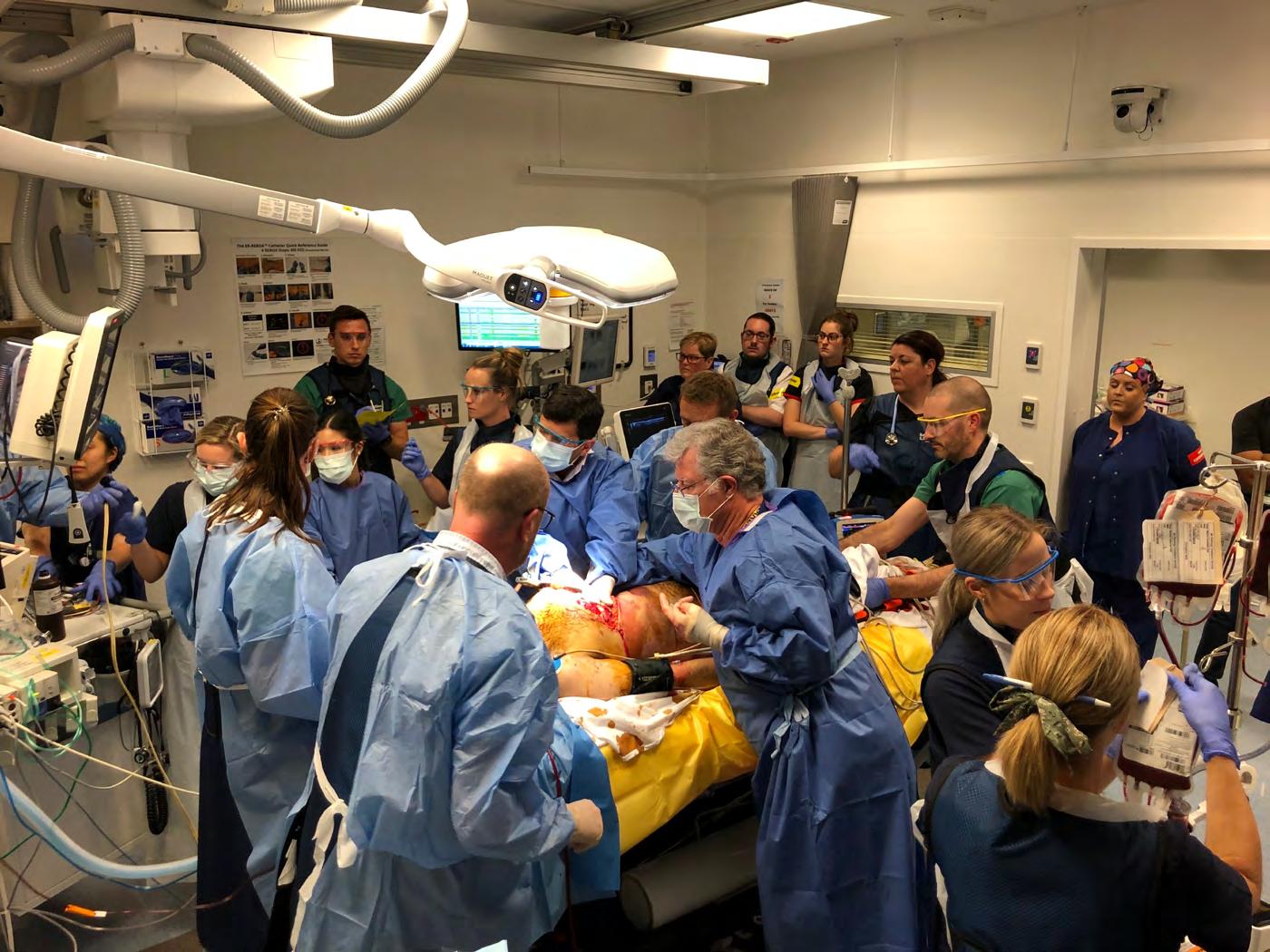
5 minute read
Revolutionising trauma surgery in Adelaide
Dr Peter Bautz’s career is full of remarkable experiences around the globe
The sign on the office door simply says: Clinical Lead, Consultant Trauma Surgeon. It gives no hint that its occupant, Dr Peter Bautz, had applied for both medicine and engineering on completing secondary school in South Africa. And it was a stroke of luck that he chose the medical path as it led to a journey full of remarkable experiences. This has also contributed to his success in revolutionising trauma surgery at the Royal Adelaide Hospital. Dr Bautz recalls surviving the brutal medical training in South Africa and feels that completing his internship in surgery was a pivotal moment. “I decided I wanted to focus on surgery because in comparison to medicine, it was so dynamic and exciting.” Soon after graduating, Dr Bautz was drafted into compulsory military duty as a ward doctor in the Border War against Cuba. This influenced his outlook and determination as a doctor, and later as a surgeon. Dr Bautz found himself often working without supervision, in extreme circumstances, doing whatever he could to keep war casualties alive, including surgery and anaesthetics. “I resolved that in the future any junior that works under me will not be left alone.” Intense officer training and army service cemented a resolve that would help him in war, and later in Saudi Arabia and Adelaide. ‘Never retreat. Never give up’ became his motto. Dr Bautz completed two years of military service and returned to Johannesburg to qualify as a surgeon. As a surgical registrar, with his wife Dr Dee McCormack, a medical officer in the same training unit, Dr Bautz performed South Africa’s first surviving thoracotomy on a police officer who had been shot in the groin, hitting a femoral artery. In those days, under Dutch-Roman law, married couples were not allowed to work together so they achieved notoriety for a brief period. A further 10 years of compulsory parttime military duty as a surgeon ensued. At that time, the war was essentially over so his team ran word of mouth clinics that serviced the local population wherever they were posted for months at a time. Following this, Dr Bautz returned to work in South Africa before following his wife to rural Africa for two years. Saving patients with injuries from wild animals such as hippos, crocodiles, and wart hogs gave him a unique perspective on trauma. They returned to Cape Town where Dr Bautz started working at the Groote Schuur Hospital (where the world’s first successful human heart transplant was performed in 1967). Dr Bautz converted the trauma unit from a non-surgical unit to a full surgical unit in four years—the first dedicated surgical trauma unit in the Western Cape. The work was intense. “In South Africa, 70 to 80 per cent of all surgical work is trauma related,” Dr Bautz said. “There is a never ending, overwhelming supply. We received around 400 stabbing victims each month, with gunshot victims averaging 110 a month. They came from drug wars, vigilante groups, crime, territorial disputes.” One weekend the hospital received 18 stabbed heart victims. Dr Bautz and a Dutch military surgeon opened 14 chests that weekend. All survived except one patient who died three days later of cause unknown. An offer to set up a trauma unit at the King Faisal Hospital in Riyadh, Saudi Arabia, saw Dr Bautz and his family relocate to Riyadh. They planned to stay for two years but ended up staying for five and a half years. He performed the first successful thoracotomy on a stabbed heart victim in Saudi Arabia. Unfortunately, the dramatic escalation of violence in Riyadh as the result of 9/11 resulted in major bomb attacks by Al-Qaeda targeting the western compounds close to where Dr Bautz and his wife worked, the family lived, and the children went to school. Management of bomb and blast trauma injuries, therefore, became a part of his extensive surgical repertoire. From his numerous experiences in Saudi Arabia, he remembers accompanying the royal convoy into the desert as an astonishing, if not a surreal experience. But the incident that had international impact was when he saved the life of Middle East BBC correspondent Frank Gardner. The journalist was shot six times when his crew was ambushed by Al-Qaeda. Dr Bautz retrieved the correspondent from a small hospital in an ambulance with a major police convoy and performed multiple surgeries. The incident was captured in Frank Gardner’s book Blood and Sand. An email from Dr Bill Griggs from the Royal Adelaide Hospital inviting Dr Bautz to join the trauma department arrived at the right time. Previous RACS president Dr Ian Civil had audited the trauma department and recommended that a surgeon be appointed to the non-surgical unit. The offer was accepted. His wife, Dee, joined the Adelaide Women’s and Children’s Hospital as an obstetrician and gynaecologist.
Advertisement
“I brought in first world trauma practices and revolutionised the department, which, from a trauma perspective, was outdated. It was a tough journey, and I faced a lot of resistance,” Dr Bautz said. “It was not easy being a path finder.” Dr Bautz led by example. For the first 18 months he was the first on-call to personally handle nearly all trauma cases. He demonstrated the improvement in outcomes when a surgeon attends and treats patients from resuscitation to recovery in ICU and then the ward. Mortality rates from major trauma halved during that time. Another trauma surgeon joined Dr Bautz, easing his on-call load. This allowed him to finally enjoy some of his hobbies—amateur photography and scuba-diving. A two-tier call system was introduced: one for general surgery and one for trauma, rostered 24/7. Dr Bautz also faced fierce resistance when introducing new methods of damage control in trauma, such as performing thoracotomies for arresting trauma patients, open abdomens for damage control and non-operative intravascular embolisation.
Today, Royal Adelaide Hospital is a Level 1 Trauma Centre and Quaternary Referral Centre for the state. It provides exemplary trauma surgical training for registrars and Fellows with the current trauma surgeons on the unit trained by Dr Bautz. It is immensely satisfying for Dr Bautz to see that the initiatives he introduced 17 years ago are now part of standard surgical training and practice in trauma across Australia. His success in transforming trauma management in Adelaide can be attributed to his fortitude and determination, extraordinary experiences in South Africa, Angola, and Saudi Arabia, and the unwavering support of his wife, Dee. ‘Never retreat. Never give up.’ The motto has stood him in good stead.




Images: Dr Peter Bautz; scuba diving; resus room; trauma unit scenes.










